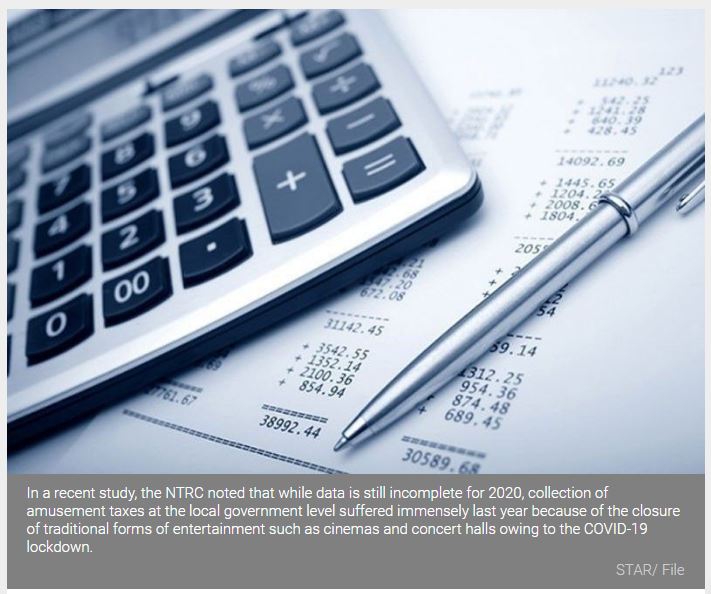Philippines: Expansion of local amusement tax eyed
MANILA, Philippines — The National Tax Research Center (NTRC) is calling for the review of the Local Government Code (LGC) of 1991 with the goal of expanding the coverage of local amusement tax to capture revenues from entertainment businesses.
In a recent study, the NTRC noted that while data is still incomplete for 2020, collection of amusement taxes at the local government level suffered immensely last year because of the closure of traditional forms of entertainment such as cinemas and concert halls owing to the COVID-19 lockdown.
“LGUs, which are leading the fight against the COVID-19, need a more stable source of revenue to finance their different programs and activities to provide services to their constituents, especially during this time of pandemic,” said the report.
“Accordingly, Congress should consider reviewing the LGC of 1991, as amended, to align the limitations and taxing powers of LGUs to modern business models. For instance, expanding the coverage of local amusement tax may be explored by policymakers to provide additional revenue to LGUs.”
Two types of amusement taxes are collected in the country. The first is imposed by the national government through the Bureau of Internal Revenue (BIR) and the other is the local amusement tax imposed by the province, city, and municipality within Metropolitan Manila Area as provided for by the LGC.
Estimates for 2020 remain incomplete, but NTRC estimates a strong decline in local amusement taxes especially because LGUs in the Greater Manila Area account for almost half of amusement tax collections.
“In response to the lockdown, go-to places such as malls, theaters, and concert halls were closed for the time being. As such, events were suspended and even movies and concerts were cancelled. Thus, a considerable revenue loss from amusement taxes are expected,” said the study.
For instance, forgone revenues from the cancellation of six major concerts alone at the Mall of Asia Arena, Amoranto Stadium and Araneta Coliseum in 2020 was placed at P9.81 million, assuming that 50 percent of seating capacity was sold at the lowest ticket price.
In the case of local amusement tax from movie theaters, the estimated forgone revenue was P83.74 million during the strict lockdown from March 17 up to May 31 last year. This was based on four screenings per day for 77 days in 433 cinemas at 25 tickets sold per screening at a price of P250 per ticket.
By the third quarter of 2020, NTRC estimates that revenue loss from forgone amusement taxes in local government units reached P376 million as of Sept. 30, 2020.
Total local amusement tax revenue for the third quarter of 2020 was estimated at P55.47 million, P320.92 million lower than P376.39 million collected in the same quarter in 2019.
“On the other hand, as 2020 data is not yet available, the national amusement tax revenue is also expected to drop because of the pandemic,” the NTRC said.
The tax research body said that in the process of reviewing the local government code, new forms of entertainment like online shows can be tapped into as sources of revenues.
“The pandemic suspended or cancelled most, if not all, entertainment shows and programs. However, there are online streaming shows that can still be classified as sources of amusement. The LGUs can tap these sites as sources of tax revenues as the country enters the chapter of the “new normal,” said NTRC.
“LGUs need a broader range of revenue tools. These should include revenue sources that automatically grow with the economy, and at present live streaming may be closely considered as an additional revenue source of LGUs,” the report said.
“However, it is crucial that social and economic issues are taken into consideration so that new funding sources shift costs fairly on those who can most afford to pay,” it said.
Source: https://www.philstar.com/business/2021/02/22/2079414/expansion-local-amusement-tax-eyed


 Thailand
Thailand




